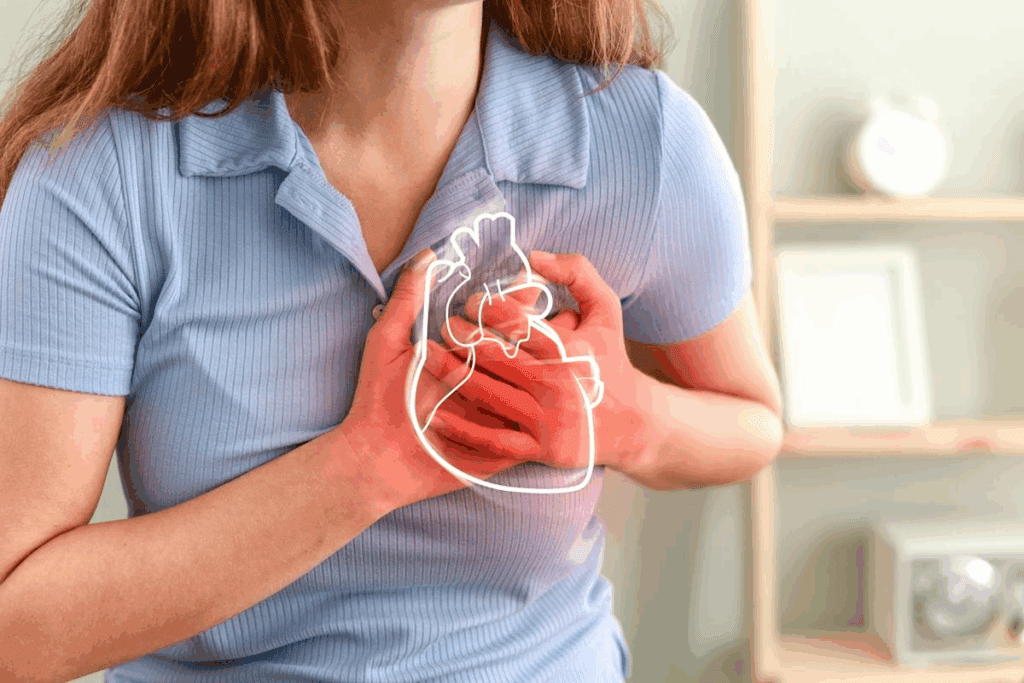Last Updated on November 25, 2025 by Ugurkan Demir

Telling if stomach pain is from a heart attack or indigestion is hard. At Liv Hospital, we know how important it is to figure out what’s wrong. We want to make sure you get the right help.Learn how can signal a stomach pain heart attack or simple indigestion.
Chest pain and stomach discomfort can mean serious health problems, like heart issues. Doctors say if you’re not sure, you should see a doctor right away.
We focus on you, making sure we check every symptom. This way, we can give you the right answers about your health fast.

The esophagus and heart are close together. This closeness is why many people mix up heartburn with angina and vice versa.
Heart problems can cause pain in the chest or upper belly. This pain can also spread to the back, neck, or arms. It’s easy to confuse this with heartburn or indigestion.
Heart attack symptoms are not always clear. This makes it hard for people to know if their pain is from their heart or stomach.
The esophagus and heart are close. This is why many people get heartburn and angina mixed up. This closeness can cause referred pain, where pain from one area feels like it’s coming from another.
Knowing how these areas are related is key to figuring out what’s causing symptoms.

Stomach pain can sometimes hide a heart attack, which is more common in certain groups. It’s often linked to digestive problems, but it can also signal a heart issue. Knowing the difference between stomach pain from a heart attack and other issues is key.
Heart attacks don’t always show up with the usual symptoms. Stomach pain can be a sign, as Medical Expert, a cardiologist, points out. “Signs of a heart attack aren’t always obvious and can sometimes resemble heartburn symptoms.” This makes it important to know the difference between heart and stomach pain.
More than 60 percent of chest pain cases seen in clinics are not heart-related. But, heart and stomach pain can look similar, which is a problem for women and older adults. It’s important to carefully check symptoms to find the real cause.
Women and older adults often have heart attack symptoms that are not typical. They might feel stomach pain, discomfort, or nausea instead of the usual chest pain. These symptoms can mean a heart attack in these groups.
It’s critical to spot these unusual symptoms to get help quickly. Knowing the risk factors and subtle signs of a heart attack is important, even if stomach pain is the main symptom.
Telling acute from chronic symptoms is important for diagnosing heart attacks. Acute symptoms come on suddenly and are very severe, needing quick medical help. Chronic symptoms last longer or come back over time.
Knowing how long and how bad stomach pain is can help figure out if it’s from a heart attack or something else. We’ll look at the differences between acute and chronic symptoms and what they mean for diagnosis and treatment.
Coronary heart disease (CHD) affects millions globally. Knowing its symptoms is key for early treatment. We’ll cover the typical signs of CHD to help you spot heart issues early.
Chest pressure or discomfort is a major symptom of CHD. It feels like squeezing or tightness in the chest. This feeling can last or come and go, getting worse with exercise or stress. It’s important to remember that the discomfort might not always be severe; it can feel like mild pressure or indigestion.
Pain from CHD can spread to the arms, back, neck, jaw, or stomach. This happens because the nerves that serve the heart also cover these areas. The pain can be a dull ache or a sharp, stabbing feeling, sometimes with lightheadedness or shortness of breath.
Symptoms of CHD get worse with exercise and better with rest. If you have chest pain, shortness of breath, or other symptoms during activity and they go away when you rest, your heart might not be getting enough oxygen. Knowing these patterns helps you and your doctor figure out what to do next.
Understanding these classic symptoms of coronary heart disease is the first step to protecting your heart. If you notice any of these signs, seeing a healthcare professional for an evaluation and treatment is essential.
It’s important to know the signs of indigestion and heartburn to tell them apart from heart problems. Indigestion, or dyspepsia, is discomfort in the upper belly, often after eating or drinking. Heartburn happens when stomach acid goes up into the esophagus, causing a burning feeling.
Indigestion feels like a dull ache or burning in the upper belly. It might spread to the back or come with bloating and nausea. Heartburn, by contrast, is a sharp, burning chest pain that gets worse when you lie down or bend over.
Some foods and drinks can trigger indigestion, like spicy, fatty, or caffeinated ones. When indigestion happens can vary. It might strike during or after meals, or hours later. Knowing what triggers it and when can help manage it.
There are ways to ease indigestion and heartburn symptoms. Antacids or acid reducers can quickly help by balancing stomach acid or cutting its production. Staying away from trigger foods, eating smaller meals, and not lying down after eating can also help.
| Symptom | Indigestion | Heartburn |
| Typical Pain Location | Upper abdomen | Chest, behind the breastbone |
| Triggers | Eating certain foods, stress | Lying down, bending over, eating trigger foods |
| Relief | Antacids, avoiding trigger foods | Antacids, acid reducers, lifestyle changes |
It’s important to know the difference between heart attack stomach pain and indigestion. Both can hurt the upper abdomen, but they have different causes and effects.
Heart attack pain is usually more severe and lasts longer than indigestion. It can stay for over 15 minutes, sometimes hours.
On the other hand, indigestion is shorter and less intense. It might come and go, but it’s not as bad as heart attack pain.
Heart attacks have symptoms like shortness of breath and pain in the arms or jaw. These are rare in indigestion.
Heart attack pain also gets worse with exercise and can cause nausea. If you have these symptoms, get help fast.
How well remedies work is another clue. Indigestion usually gets better with antacids quickly. But heart attack symptoms don’t.
Medical Expert, “If unsure, go to the emergency room right away.” This could save your life, as heart attacks are serious.
Knowing these differences helps you make better health choices. It ensures you get the right care when you need it.
It’s key to know the risk factors for heart disease early. This helps us spot who might face heart problems.
Some health issues raise heart disease risk a lot. Hypertension, diabetes, and high cholesterol are big ones. It’s vital to manage these with meds and lifestyle changes to lower heart attack risk.
Obesity and kidney disease also up heart risk. We need to tackle these issues to protect heart health.
Our lifestyle choices greatly affect our heart health. Smoking and tobacco use harm the heart and blood flow. They’re big risks for heart disease.
A sedentary lifestyle and eating too much saturated fats and sodium also raise heart risk. We suggest staying active and eating well to keep weight in check and lower heart disease risk.
A family history of heart disease is a big warning sign. It means you might be more likely to get heart disease. People with heart disease in their family should watch their risk factors closely.
Genetic conditions like familial hypercholesterolemia also up heart disease risk. We stress the need for genetic tests and early action for those with a family history.
By tackling these risk factors, we can prevent heart problems. This helps keep our hearts healthy.
The difference between indigestion and a heart attack can be hard to tell. Medical Expert, “Don’t ignore symptoms or wait to see if they get worse. Get medical help right away.”
Some symptoms are clear signs of heart trouble. These include:
These symptoms mean you might be having a heart attack. You need to get medical help fast.
Many people think heart attack symptoms are just indigestion. This can cause them to wait too long to get help. Heart attack pain can feel like indigestion, but ignoring it can be very dangerous.
Don’t take a chance by thinking it’s just indigestion. If you have any unusual or lasting symptoms, it’s safer to be cautious.
When you call for help or go to the emergency room, tell them everything about your symptoms. Be ready to say:
By sharing this info, doctors can make a good diagnosis and give the right treatment.
Knowing when to act can save your life. If you’re not sure about your symptoms, it’s always best to get medical help.
To figure out if symptoms are from the heart or stomach, a detailed check is needed. When people have chest or stomach pain, doctors use many tools to find the cause.
Several tests are used to spot heart problems. An electrocardiogram (ECG) is key, as it checks the heart’s electrical signals. Blood tests look for signs of heart damage, like troponin levels. Cardiac imaging methods, like echocardiography, show how the heart works.
These tests help find heart issues like blocked arteries or heart attacks. They check the heart’s electrical signals, blood flow, and shape. This helps doctors know if there’s a problem and how serious it is.
Testing for stomach problems is different. Endoscopy lets doctors see the upper stomach, and colonoscopy looks at the lower part. Imaging studies like CT scans or ultrasound spot problems like gallstones.
Gastrointestinal motility tests check how food moves through the stomach. These tests, along with what the patient says and their symptoms, help find issues like acid reflux or IBS.
A thorough check is key because it looks at both heart and stomach problems. By mixing different tests, doctors can find the real cause and plan the right treatment.
We stress that symptoms shouldn’t be ignored as “just indigestion” without a full check. A detailed evaluation not only finds the right problem but also makes sure there’s no serious heart issue.
It’s important to know the difference between heart attack symptoms and indigestion. This knowledge helps us take care of our heart and digestive health. By spotting warning signs and risk factors early, we can get medical help fast. This can lower our chances of heart problems.
Medical Expert. To keep your heart healthy, try eating well, exercising regularly, and managing stress. For your digestive health, avoid foods that upset you and eat smaller meals.
It’s also key to prevent heart issues by controlling blood pressure and cholesterol. Being proactive and informed can greatly reduce heart risks. This way, we can stay healthy and feel good overall.
Yes, stomach pain can be a sign of a heart attack, more so in women and older adults. It often comes with other signs like chest pain, shortness of breath, or feeling dizzy.
Heartburn usually happens after eating and goes away with antacids. It might also taste sour. Angina, though, comes on with effort, stress, or big meals. It can also make you feel short of breath or tired.
Yes, coronary heart disease can lead to stomach pain, known as angina or referred pain. This pain is a sign of less blood to the heart.
Classic signs include chest pressure or discomfort, pain in the arms, back, neck, or jaw. Symptoms get worse with more activity.
If stomach pain is with chest discomfort, shortness of breath, or dizziness, get medical help. Also, watch out if you have risk factors like high blood pressure, diabetes, or heart disease in your family.
Indigestion is usually about digestion, but it can hint at heart disease if you also have chest pain or shortness of breath.
Risk factors include high blood pressure, diabetes, and high cholesterol. Lifestyle factors like smoking, not moving much, and eating too much fat are also risks. Family history and genes matter too.
Get emergency help for severe, ongoing, or getting worse stomach pain. Also, seek help if it’s with chest pain, shortness of breath, or dizziness.
Tests like ECGs, stress tests, and blood work help find heart problems. For digestive issues, endoscopy, colonoscopy, or imaging studies are used.
Yes, a stomach ache can mean a heart attack, if it’s with chest discomfort or shortness of breath.
A healthy lifestyle helps. Eat well, exercise, don’t smoke, and manage stress. This reduces risks for both heart disease and digestive problems.
Ruel, M. (2024). Coronary artery bypass grafting: Past and future. Circulation, 150(10), 763-766. https://www.ahajournals.org/doi/10.1161/CIRCULATIONAHA.124.068312
Subscribe to our e-newsletter to stay informed about the latest innovations in the world of health and exclusive offers!